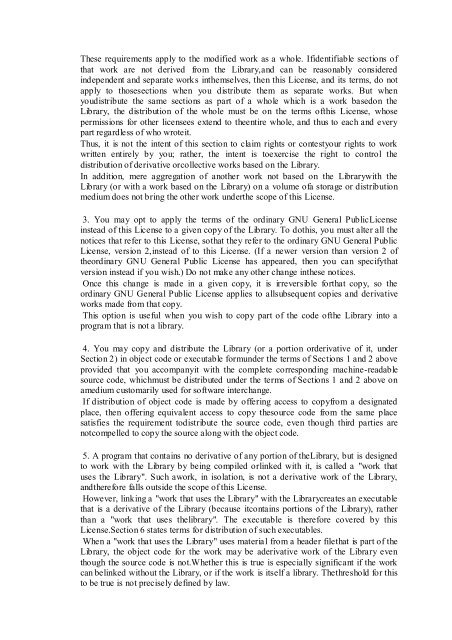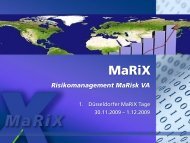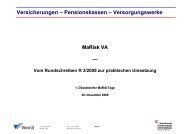der Software xAlerator - Xapio GmbH
der Software xAlerator - Xapio GmbH
der Software xAlerator - Xapio GmbH
Create successful ePaper yourself
Turn your PDF publications into a flip-book with our unique Google optimized e-Paper software.
These requirements apply to the modified work as a whole. Ifidentifiable sections of<br />
that work are not <strong>der</strong>ived from the Library,and can be reasonably consi<strong>der</strong>ed<br />
independent and separate works inthemselves, then this License, and its terms, do not<br />
apply to thosesections when you distribute them as separate works. But when<br />
youdistribute the same sections as part of a whole which is a work basedon the<br />
Library, the distribution of the whole must be on the terms ofthis License, whose<br />
permissions for other licensees extend to theentire whole, and thus to each and every<br />
part regardless of who wroteit.<br />
Thus, it is not the intent of this section to claim rights or contestyour rights to work<br />
written entirely by you; rather, the intent is toexercise the right to control the<br />
distribution of <strong>der</strong>ivative orcollective works based on the Library.<br />
In addition, mere aggregation of another work not based on the Librarywith the<br />
Library (or with a work based on the Library) on a volume ofa storage or distribution<br />
medium does not bring the other work un<strong>der</strong>the scope of this License.<br />
3. You may opt to apply the terms of the ordinary GNU General PublicLicense<br />
instead of this License to a given copy of the Library. To dothis, you must alter all the<br />
notices that refer to this License, sothat they refer to the ordinary GNU General Public<br />
License, version 2,instead of to this License. (If a newer version than version 2 of<br />
theordinary GNU General Public License has appeared, then you can specifythat<br />
version instead if you wish.) Do not make any other change inthese notices.<br />
Once this change is made in a given copy, it is irreversible forthat copy, so the<br />
ordinary GNU General Public License applies to allsubsequent copies and <strong>der</strong>ivative<br />
works made from that copy.<br />
This option is useful when you wish to copy part of the code ofthe Library into a<br />
program that is not a library.<br />
4. You may copy and distribute the Library (or a portion or<strong>der</strong>ivative of it, un<strong>der</strong><br />
Section 2) in object code or executable formun<strong>der</strong> the terms of Sections 1 and 2 above<br />
provided that you accompanyit with the complete corresponding machine-readable<br />
source code, whichmust be distributed un<strong>der</strong> the terms of Sections 1 and 2 above on<br />
amedium customarily used for software interchange.<br />
If distribution of object code is made by offering access to copyfrom a designated<br />
place, then offering equivalent access to copy thesource code from the same place<br />
satisfies the requirement todistribute the source code, even though third parties are<br />
notcompelled to copy the source along with the object code.<br />
5. A program that contains no <strong>der</strong>ivative of any portion of theLibrary, but is designed<br />
to work with the Library by being compiled orlinked with it, is called a "work that<br />
uses the Library". Such awork, in isolation, is not a <strong>der</strong>ivative work of the Library,<br />
andtherefore falls outside the scope of this License.<br />
However, linking a "work that uses the Library" with the Librarycreates an executable<br />
that is a <strong>der</strong>ivative of the Library (because itcontains portions of the Library), rather<br />
than a "work that uses thelibrary". The executable is therefore covered by this<br />
License.Section 6 states terms for distribution of such executables.<br />
When a "work that uses the Library" uses material from a hea<strong>der</strong> filethat is part of the<br />
Library, the object code for the work may be a<strong>der</strong>ivative work of the Library even<br />
though the source code is not.Whether this is true is especially significant if the work<br />
can belinked without the Library, or if the work is itself a library. Thethreshold for this<br />
to be true is not precisely defined by law.




